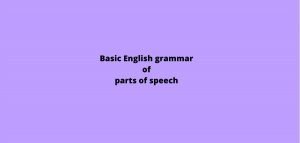
Let’s stars this -Basic English grammar rules to understand
INTRODUCTION
1 Noun –name of person, place, animal or things eg- Hemant, Jharkhand, Ranchi, Tiger, computer.
2.Pronoun –Used in place of noun .eg –he, she, it, I, We, You…
3.Verb– Action word (principal verb) ,helping verb,modal verb
Action word- speak ,write ,read…
Helping verb-is, am, are, was, were shall …
Modal verb-Can, could, should, may, might, must …
4. Adjective -qualifies noun & pronoun eg -tall, good, smart…
5.Adverb-modifies verb ,an adjective ,.eg-loudly ,fast …
6.Preposition –used before noun & pronoun & shows relation with each other eg-in, on, at, from, since…
7.Conjunction –joining word or sentence. eg-and, but ,also ,or, ,neither ……nor ,either….or …
8. Interjection –expresses the sudden feeling of joy & sorrow .eg –oh!. Ah!, wow! hurrah! …

1.NOUN-Kinds of noun –
1.Proper noun –the name of a particular person or place or thing. Jharkhand, Deepak, computer…
2.Common noun –common to every person or place of the same class.eg- teacher, student, doctor girl boy …
3.Collective noun –collection of personal things .eg –class, crowd, jury, army, herd,
4.Material noun –the name of substance a thing is made of eg-silver, gold, wood, oil …
5. Abstract noun –shows quality, action, state eg-honesty, kindness, movement, judgment, childhood, boyhood, youth sickness, death, poverty…
Now –Noun divided into two parts
Countable noun –book, pen, apple, boy, sister, teacher, doctor…
Uncountable noun –milk, oil, sugar, salt, gold, honesty…
2.Pronoun –
a.Personal pronoun
First-person Second person Third person
S P S p S P
I, MY WE YOU YOU HE, SHE,(Name) THEY
MINE OURS YOURS HIS, HER THEIR
ME US IT
b.Reflexive pronoun –subject & object are the same eg-I will solve this problem myself
c. Relative pronoun –who, which, whose, that join two sentences.eg – I found the book which I lost yesterday.
d.Interrogative pronoun –Used for asking questions.
Eg-What is your qualification?
e.Demonstrative pronoun –This, that .these. those are used to demonstrative .eg-This is my book.
f.Distributive pronoun –each either, neither used for person or thing .eg – each of the students has a bag
3.VERB
a. Principal verb– come, go, write.
kinds of principal verb 1.Intransitive verb-needs no object. eg-the sun shines.2. Transitive verb needs object.eg-Mohan reads a book.
b. Helping verb– is, am, are, was, were, has, have, had, shall, will..(be)
v1 v2 v3 v4( ing) v5 (s/es)
write wrote written writing writes
play played played playing plays
4.Adjective –
Teacher-experienced strict, punctual, sincere…
Student -Laborious ,punctual decent ,honest…
V4 as an adjective –drawing-room drinking water, greeting card …
V3 as an adjective –spoken English, disciplined students, boiled egg….
5.Adverb–
1.Adverb of time (when ) I go for a walk daily.
2.Adverb of place (where)The bus stopped here.
3.Adverb of manner(how)The students speak loudly.
6.Preposition – In– big city, place–he lives in Delhi.
At – Small city, place,-They lived at Ranchi in Jharkhand
To/Into– He goes to school, he jumped into the river
Among-More than two, he distributed the mango among children
Between –For two-person or things, he distributed the mango between Ram & Shyam.
Beside – By the side of -,Raj hospital is situated beside V mart.
Besides –In addition to, I know English besides Hindi.
Within –To indicate completion of work before the end of a period,
I’ll finish the work within 6 months.
Since –point of time, I have been learning English since 2019.
For –a period of time, I have been learning English for 3 years.
From– Shows separation, a relation of time, I am coming from college.
She reads at night from 9 to 11.
With –used before the instrument, He writes with a pen.
By-used with an agent, A tiger was killed by Ram
On –The book is on the table.
Over-The fan is moving over us./ The airplane is flying over the tree.
Under –The pen is under the desk.
Above –the sun rose above the hill.
7.Conjunction – And – Rohan and Shyam are going.
But –Rita is present but Geeta is absent.
Therefore –He is ill therefore he is weak.
If – If you work hard, you will succeed.
When – when I went to Agra, I saw the Taj mahal.
While – I met my uncle while am going to college.
Than –The Sun is brighter than the Moon.
Then –read the question carefully then write the answer.
Because – He can not run fast because he is ill.
Although –Although we played well, we lost the match.
Or– Take tea or coffee.
8.Interjection
Hello! how are you.
Aha! what a delicious food.
Hurrah! we won the match.
Oh! what an accident.
Alas! he died.
Bravo! good shot.

I hope guys you like this post-Basic English grammar rules to understand.
Thank you very much for sharing, I learned a lot from your article. Very cool. Thanks. nimabi
Thanks